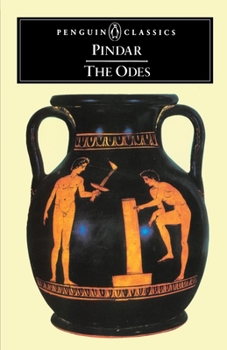The Odes
Select Format
Select Condition 
Book Overview
'What Pindar catches is the joy beyond ordinary emotions as it transcends and transforms them' --C. M. Bowra Arguably the greatest Greek lyric poet, Pindar (518-438 B.C.) was a controversial figure in fifth-century Greece--a conservative Boiotian aristocrat who studied in Athens and a writer on physical prowess whose interest in the Games was largely philosophical. Pindar's Epinician Odes--choral songs extolling victories in the Games...
Format:Paperback
Language:English
ISBN:014044209X
ISBN13:9780140442090
Release Date:December 1982
Publisher:Penguin Publishing Group
Length:256 Pages
Weight:0.43 lbs.
Dimensions:0.7" x 5.0" x 7.7"
Customer Reviews
2 ratings
Pindar's Odes: The Mytho-Poetic and Heroic Spirit of Ancient Greece
Published by Thriftbooks.com User , 16 years ago
Scholars today generally consider Pindar (ca 513-438 BC) to be the best lyric poet of ancient Greece. Among the ancients Pindar's high-repute was also, with out a doubt, universally accepted. We may base this on account of Plato's admiration of him, who spiritedly quotes and alludes to Pindar more than a dozen times in his dialogues. Thus, Plato's nod of approval undoubtedly seals Pindar's canonicity as a legitimate poet. Practically, the Odes of Pindar celebrate--and are an encomium of--the victories of athletes in the pan-hellenic games. Events ranged from wrestling to chariot-races, from boxing to foot-races and the pentathlon, to name a few. Adding a further charm, flare and substance to the odes are the pithy mythological tales worked into the theme of each poem: the tales told were of the gods, and or, heroes traditionally tied to the cities in which the games were held--where the victorious athletes gained their crown. The basic structure of the odes is comprised of three portions: (1) they open and close with praise of the victor, (2) have a central mythological tale, (3) and conclude with moral, and or, didactic admonitions with religious and philosophical implications. In a word, the Odes of Pindar are phenomenal poetry and the student of the classical world cannot pass the Odes over, since they embody the spirit of classical Greece; and general lovers of poetry cannot pass the Odes over, simply because they are good poetry. Therefore, no classicist or lover of poetry should be without the Odes of Pindar in their collection. Excerpt from (Isthmian, 6.1): "...if any man delights in expense and effort/ And sets in action high gifts shaped by the Gods/ And with destiny/ Plants the glory which he desires/ Already he casts his anchor on the furtest edge of bliss,/ And the Gods honor him."
Ian Myles Slater on: Bowra's Pindar, Not Lattimore's
Published by Thriftbooks.com User , 21 years ago
I am here reviewing C. M. Bowra's translation of "The Odes of Pindar" for the Penguin Classics, not Richmond Lattimore's version from the University of Chicago Press, my review of which has been appearing under this heading as well. Fortunately, I rank Bowra's work as highly as Lattimore's, so I won't have to quibble over how many stars should be assigned. Lattimore's translation is, at the moment, out of print; one hopes that Penguin will keep Bowra's available. I will refer to a third translation, as well. Pindar was one of the most famous poets of ancient Greece, and besides fragments (which are all that survive of most of his rivals) we have four reasonably intact books out of a much larger collection. As it happens, the four books contain celebrations of victors at major Games (Olympic and three others, Pythian, Isthmian, and Nemean), and are otherwise unlike what moderns think of as typical poetry. They are also densely allusive, and in a Greek which is generally acknowledged to be as difficult to follow as it is beautiful. My own command of Greek is too small to judge, but Bowra is one of several modern translators who have managed to persuade me to read him for pleasure, rather just than for his allusions to myths and heroic legend. Bowra, who also wrote a major work on Pindar, provides useful annotations to a very attractive translation. He also decided to arrange the poems according to their likely dates, or at least the dates assigned to them by ancient scholars who had list of victors in the various games. There are inherent problems with this, since some of the Odes actually relate to victories in other Games, and some were certainly performed at delayed celebrations. On the whole, however, it does give some sense of Pindar as a developing poet, and of the Victory Ode as a form continuing to grow during his career. The real drawback is the need to consult a table of references to find any given poem. This can be a real annoyance for a student if Bowra is the only translation you have on hand, and you really want to check a statement supported by a reference to, say, Olympian 3, lines 7 to 10. In most translations, you can just follow the page headings. Bowra's critical writings on Pindar are now considered obsolete -- at least for the moment His translation remains worth reading, and compares well with Lattimore's, and with Richard Stoneman's recent expanded edition, with excellent critical material, of G.S. Conway's translation of the Odes, which first appeared a few years after Bowra's. This last was Issued as "Odes: and Selected Fragments," in the Everyman Paperback Classics series, and I have reviewed it, with a more extended discussion of Pindar and related critical disputes. I am glad to have all three; it would be nice if all of them were all in print simultaneously. A fourth alternative, with a translation facing the Greek texts, is the Loeb Classical Library edition, re-edited in two volumes by William H. Race (1997),






